Draft South African identity management policy published for public inputs
By Alana Bailey
A draft identity management policy has recently been published by the Department of Home Affairs. It is available at https://pmg.org.za/call-for-comment/1011/ and anyone wishing to comment on it, has to submit the inputs to the department by 28 February 2021.
Some of the main objectives of the policy include to:
- reposition the Department of Home Affairs as the sole provider of official identity and civic status verification services;
- establish rules that govern accessing and processing population register data in line with relevant policies and legislation.
- replace the National Population Register with an inclusive, digital population register that is secure, accurate and confidential.
The challenge is to be able to share identity details with other state institutions, international stakeholders such as border control authorities and even institutions from the business world, for example commercial banks, without violating the individuals’ right to privacy and legislation in this regard.
The department is also facing the challenge of developing the system in such a way that it will keep up with the innovations that the Fourth Industrial Revolution will bring.
Currently, identity theft and social inequalities create major challenges for the management of identity information in the country.
In order to try to prevent identity theft, the inclusion of more biometric details of individuals is suggested, for example that children should be registered at birth, but that the information captured at that stage, should be supplemented when they turn five to ensure that their birth certificates will not be stolen or sold, as is currently happening.
The old green identity books urgently need to be phased out, as they have few security features which facilitates identity theft. However, no final cut-off date for the phasing out thereof is mentioned in the policy.
New identity numbers are even being considered, as the current numbers contain private information of individuals such as gender and date of birth. A random combination of automatically generated numbers will create a unique number without compromising the privacy of the individual.
Stricter legislation is being advocated to prevent cyber security breaches, such as committing identity theft.
The draft policy clearly states that these proposed adjustments will NOT affect criteria that apply to immigration, refugee status or citizenship, but are simply aimed at capturing everyone’s identity and status in the country, while ensuring that any status can be easily updated if it were to change ‒ in other words, when an immigrant with permanent residence status becomes a citizen, the system should be able to record the new status immediately.
Currently, the system only caters for two genders, namely male and female, but it is proposed that henceforth it should be adapted to accommodate more options in line with the approach of the World Health Organization (WHO).
To accommodate the poor, application costs are being reconsidered. The opinion expressed is that first applications for identity documents, birth certificates and death certificates should be free. As individuals are responsible for taking care of their documentation, a fee will probably apply to subsequent applications. A sliding scale is proposed for determining the cost. As no one is obliged to have a passport, applicants will have to pay for it from the first application according to the policy.
An ambitious timeframe is proposed for the implementation of the NIS, but the system has yet to be created and the department mentions that the training of sufficient staff and budget deficits will present major challenges.
Worldwide will monitor the process and any changes resulting from this policy will be made known via our news platforms.




















